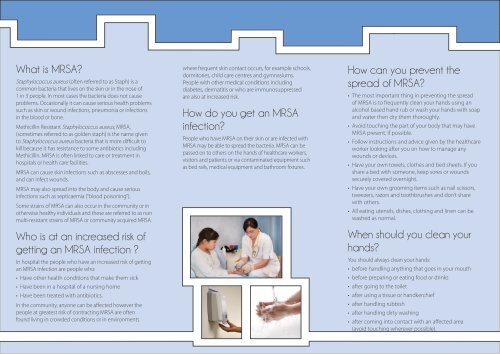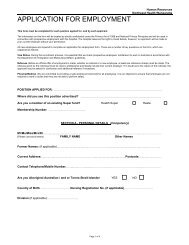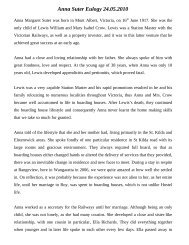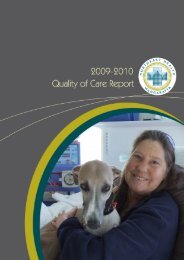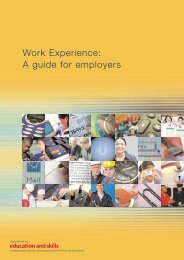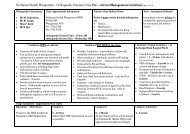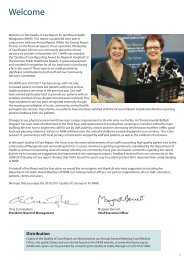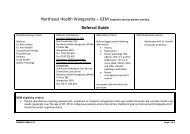Methicillin Resistant Staphylococcus aureus (MRSA)
Methicillin Resistant Staphylococcus aureus (MRSA)
Methicillin Resistant Staphylococcus aureus (MRSA)
You also want an ePaper? Increase the reach of your titles
YUMPU automatically turns print PDFs into web optimized ePapers that Google loves.
What is <strong>MRSA</strong>?<br />
<strong>Staphylococcus</strong> <strong>aureus</strong> (often referred to as Staph) is a<br />
common bacteria that lives on the skin or in the nose of<br />
1 in 3 people. In most cases the bacteria does not cause<br />
problems. Occasionally it can cause serious health problems<br />
such as skin or wound infections, pneumonia or infections<br />
in the blood or bone.<br />
<strong>Methicillin</strong> <strong>Resistant</strong> <strong>Staphylococcus</strong> <strong>aureus</strong>, <strong>MRSA</strong>,<br />
(sometimes referred to as golden staph) is the name given<br />
to <strong>Staphylococcus</strong> <strong>aureus</strong> bacteria that is more difficult to<br />
kill because it has resistance to some antibiotics including<br />
<strong>Methicillin</strong>. <strong>MRSA</strong> is often linked to care or treatment in<br />
hospitals or health care facilities.<br />
<strong>MRSA</strong> can cause skin infections such as abscesses and boils,<br />
and can infect wounds.<br />
<strong>MRSA</strong> may also spread into the body and cause serious<br />
infections such as septicaemia (“blood poisoning”).<br />
Some strains of <strong>MRSA</strong> can also occur in the community or in<br />
otherwise healthy individuals and these are referred to as non<br />
multi-resistant strains of <strong>MRSA</strong> or community acquired <strong>MRSA</strong>.<br />
Who is at an increased risk of<br />
getting an <strong>MRSA</strong> infection ?<br />
In hospital the people who have an increased risk of getting<br />
an <strong>MRSA</strong> infection are people who:<br />
• Have other health conditions that make them sick<br />
• Have been in a hospital of a nursing home<br />
• Have been treated with antibiotics.<br />
In the community, anyone can be affected however the<br />
people at greatest risk of contracting <strong>MRSA</strong> are often<br />
found living in crowded conditions or in environments<br />
where frequent skin contact occurs, for example schools,<br />
dormitories, child care centres and gymnasiums.<br />
People with other medical conditions including<br />
diabetes, dermatitis or who are immunosuppressed<br />
are also at increased risk.<br />
How do you get an <strong>MRSA</strong><br />
infection?<br />
People who have <strong>MRSA</strong> on their skin or are infected with<br />
<strong>MRSA</strong> may be able to spread the bacteria. <strong>MRSA</strong> can be<br />
passed on to others on the hands of healthcare workers,<br />
visitors and patients or via contaminated equipment such<br />
as bed rails, medical equipment and bathroom fixtures.<br />
How can you prevent the<br />
spread of <strong>MRSA</strong>?<br />
• The most important thing in preventing the spread<br />
of <strong>MRSA</strong> is to frequently clean your hands using an<br />
alcohol based hand rub or wash your hands with soap<br />
and water then dry them thoroughly.<br />
• Avoid touching the part of your body that may have<br />
<strong>MRSA</strong> present, if possible.<br />
• Follow instructions and advice given by the healthcare<br />
worker looking after you on how to manage any<br />
wounds or devices.<br />
• Have your own towels, clothes and bed sheets. If you<br />
share a bed with someone, keep sores or wounds<br />
securely covered overnight.<br />
• Have your own grooming items such as nail scissors,<br />
tweezers, razors and toothbrushes and don’t share<br />
with others.<br />
• All eating utensils, dishes, clothing and linen can be<br />
washed as normal.<br />
When should you clean your<br />
hands?<br />
You should always clean your hands:<br />
• before handling anything that goes in your mouth<br />
• before preparing or eating food or drinks<br />
• after going to the toilet<br />
• after using a tissue or handkerchief<br />
• after handling rubbish<br />
• after handling dirty washing<br />
• after coming into contact with an affected area<br />
(avoid touching wherever possible).


